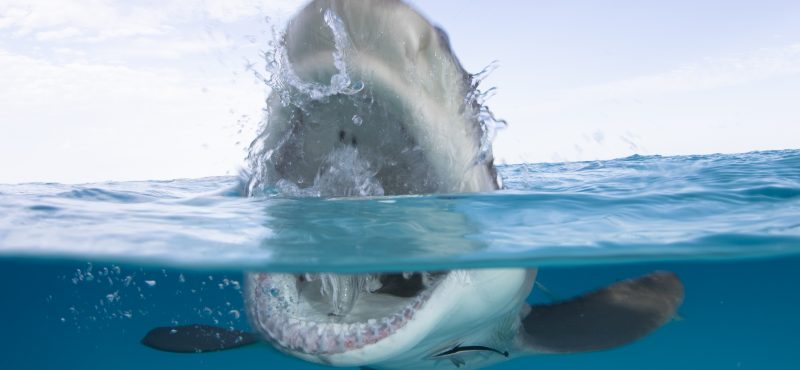It’s Shark Week, a pop-culture phenomenon that we in the Beyond community eagerly anticipate. From too cute“baby shark” onesies to fiercely delicious shark cake-pops, many of us are preparing to “dive in” to Shark Week with the great creatures that have fascinated people all over the world for centuries. This year, viewers are in for a wild ride as the evolving technology behind the “Discovery Channel’s Super Bowl” creates a more immersive experience.
In 2017, Michael Phelps raced a CGI Shark. In 2018, Discovery celebrated the 30th anniversary of Shark Week. So how does the Discovery Channel keep Shark Week new and exciting in 2019?
In an interview, Discovery Senior Vice President of Production and Development Howard Swartz gave us a look forward at what’s to come. Swartz shared that it takes a “tremendous team” to pull off the annual week of programming that’s become a staple in American television culture. From Mexico to South Africa to New Zealand, Discovery’s Shark Week team works with groups of scientists and researchers across the globe to bring the stories that viewers see and experience on their screens every summer.
“Shark Week is a party! We want to have fun with it, and we want viewers to have fun with it,” said Swartz. This year’s programming promises a slate of shows that boast amazing experiments, stunts, celebrities, humor, drama, and of course—the great science and research that remain the core of what Shark Week is all about.
Read the highlights below from the interview with Swartz about the technology and evolution of Shark Week that’s sure to make a splash this summer.
In what ways has the technology and viewership experience evolved for Shark Week in recent years?
It’s a cultural moment that is now 31 years old, and you constantly have to come up with ways to keep it fresh. Fortunately for us, we can catch a ride alongside the science and the research communities and all the great technology that they evolve every year. Whether that is camera technology, or the ability to access new depths and locations, find habitats we didn’t know previously existed, or technology that allows us to get more up, close, and personal with the sharks and to observe their behavior like never before. That really is the story of the evolution of Shark Week over the years.
From a storytelling perspective, we try all different types of storytelling. Last year, for example, we injected a lot more humor into Shark Week and a lot more celebrities. We still have all the great science and the great research [at the heart of the programming], but we also play around with different things. This year, we’re trying drama for the first time. We are airing the first ever Shark Week scripted movie which is based on a true story.
At the end of the day though, the thread that connects every Shark Week is a celebration of sharks. The sharks are the stars of all the shows. That will never change.
What sorts of technology are used in the production of Shark Week that make the shows all the more compelling and interactive?
We have played around with virtual technology… by stitching the cameras together you get this 360-degree view and we can use that for regular broadcast and it does give an interesting perspective.
But I think the actual camera technology above all has been great for Shark Week. We used to deploy these “fin cams” where these brave scientists would try to attract these great white sharks and try to put cameras on their dorsal fins as a way to observe their behavior away from the human interaction of it all. The problem was that up until recently the cameras would release after 4-6 hours and you would just get the footage you could get during those hours. Now, there’s new technology that we use this year where the cameras can have a life of up to 18 hours and they don’t even activate until the sharks move at a particular speed or hit a particular depth. You can extend the battery life even longer. That allows you to get that behavior more naturally without that human hand of intervention, which is phenomenal. It allows us to see things we couldn’t see before.
Do you see Shark Week continue to evolve in the next few years, and in what ways?
100%, I just don’t know how, and that’s the exciting bit. If you had asked me five years ago that same question, there’s no way I could have anticipated the acceleration in technology that we are actually seeing and using today. We just keep our finger on the pulse with the science and tech communities. The idea is to always create new experiences for viewers, to bring them the latest and greatest research and science out there, and to get them as up, close, and personal with these amazing animals as we can. That will always be our goal.
Header Photo: DISCOVERY CHANNEL
